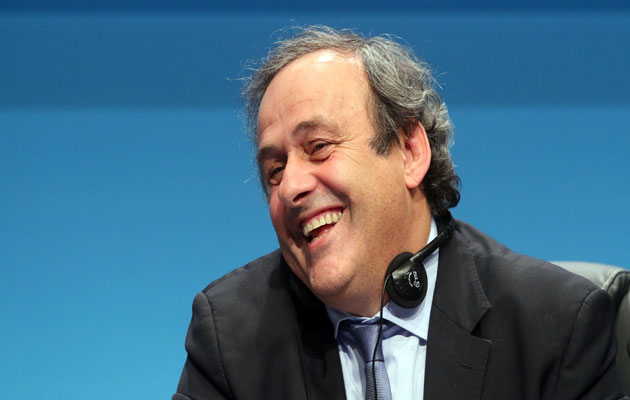The whisper was running in St Petersburg last week at the draw for the 2018 World Cup, that Michel Platini was poised to announce his candidacy for the FIFA presidency this week.
The whispers are gaining in volume, becoming squeaks and leaks, of a step for the Frenchman which has been a potential ever since Sepp Blatter brought him into the world football federation in 1998.
Blatter had just been elected president, stepping up from general secretary, with the support of a varied cast who included not only the now-disgraced Mohamed bin Hammam but also Platini himself, revelling in his role as president of the French World Cup local organising committee.
If Platini does stand, and if he wins next February 26, then one of his first set-piece appearances will be in Britain, at the annual meeting of the law-making International Football Association Board at Celtic Manor on March 4-6.
Platini came in for heavy criticism last year when he was voluble in demanding that Blatter should step down but would not stand himself. That all goes back to loyalty: Blatter appointed Platini as his ‘counsellor’ in 1998 and the Frenchman always said: “I will never stand against Blatter.”
Here he was true to his election word in contrast to the 79-year-old Swiss who reversed his own promise to stand down last May.
Perversely, it is because Blatter rebuffed Platini’s last-minute attempt to persuade him to quit that ‘Platoche’ is now within reach of the leadership of the world game.
On the morning before the election Platini told Blatter, “as an old friend,” that it was time to go. If Blatter had accepted the Prince Ali of Jordan, with Europe’s support, would have been elected without contest. Instead Blatter won a fifth term . . . which he relinquished within four days, thus presenting Platini with the opportunity he will surely grasp.
Likely opposition is thin on the ground. South Korea’s former FIFA vice-president Chung Mong-joon has talked of standing but he has been out of the arena for four years – since, ironically, the Asian confederation dumped him in favour of Prince Ali.
Sheikh Ahmad Al-Fahad Al-Sabah, the Kuwaiti who has made his name as a power-broker within the Olympic movement, is there. But his accession to the FIFA exco this past May was probably with an eye on a run for the FIFA presidency in 2015; now is too soon. To that extent Blatter, deliberately or not, has wrong-footed him.
Platini has talked with The Sheikh and with Chung in recent weeks and even days. He appears to have been built his alliances though with what ultimate effect remains to be seen.
Many close to Platini have wondered whether he really wants the presidency. Certainly he would abhor the globetrotted, 24/7 version of the job as defined by Blatter. Hence Platini will need a general secretary he can trust and UEFA’s Gianni Infantino appears the obvious man; certainly Jerome Valcke has no doubt that he is in his last months as secretary-general (not that Valcke will step down voluntarily; he is too experienced a negotiator to do that).
Platini’s move for FIFA would open a gap at UEFA. The European federation would need to decide whether to carry on under an interim leader for more than a year (since February 26 falls beyond its own nominations deadline) or call an extroardinary elective congress of its own once the 2016 European Championship finals have been wrapped up.
Germany’s Wolfgang Niersbach has been touted in some quarters as has Spain’s veteran Angel Villar. But there are significant reservations about both at this stage in their administrative careers. Dutchman
Michael Van Praag might be a suitable, short-term compromise candidate – a sort of reward for challenging Blatter so openly and brazenly last year.
All of this depends, of course, on Platini wanting to make the move from Nyon to Zurich . . . and announcing it any time soon.







